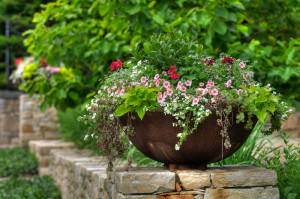Growing Healthy Container Plants
Container plants open up so many opportunities, they allow you to grow any number of plants within the confines of an elegant statement box. They overturn conventional gardening as well, allowing greenery to grow just about anywhere, from apartment balconies to stucco and concrete office buildings. It’s easy to enjoy all of the wonderful benefits container planters provide, simply follow these tips for healthy container plants season after season.
Make Sure There Is Proper Drainage
You want to be sure that the container you select will offer enough drainage to your plants. Many pots on the market do not allow enough drainage, which can cause a whole host of problems—including your entire plant rotting away because the soil is consistently too moist. There’s a rumor that you can line your planters with rocks or stones to help with drainage, but this not going to do much unless you have a plant that prefers moist soil, or you water the perfect amount every time. A high quality planter that properly drains is a must for healthy container plants. To help with proper water retention for potted plants, our self-watering containers are an excellent option as well.
Plant Compatible Flowers
If you are planning to plant multiple types of greenery in one planter, first make sure these breeds require the same sort of care, otherwise one will thrive and the other(s) will not. Basic watering, sun, and shade needs should align so that the placement of this planter doesn’t jeopardize a part of its population. Save the tag that comes with each plant, these can be very telling later on. You think you will remember what plants you selected and exactly how to care for each one, but it rarely works out that way. By keeping the exact names and care instructions for all of the container plants in your garden you can make sure to always plant compatible neighbors.
Give Plants Room to Grow
Plants need adequate size to grow, and many take a long time to fully mature. In order to allow healthy root growth, make sure plants are housed in containers that provide ample extra space. Plants don’t simply grow upwards and out, the roots are also going to grow, extending deep down into the soil. Radishes, chives, and lettuce all need at least 6 inches of root growth, while miniature trees need as much as 18-24 inches to spread their roots. Planters that are too small can be most difficult to manage as they easily dry out and make for poor root insulation. Once plants have adequate room to grow, the look of your landscape can really come together over time.
landscape can really come together over time.
Keep Up With Basic Plant Grooming
Planters keep plants in closer range than when planted into the ground, this tightly packed environment can make the spread of plant disease more likely.Therefore, no matter how low maintenance your garden is, every plant is going to need regular maintenance to keep strong season after season. It’s important to groom your plants frequently, pruning away any dead leaves or buds to make room for new leaves, and ward off a heightened risk of fungus spreading to plants.
Prepare Container Plants For Winter
Container plants can easily dry out in either the winter or the summer, it’s important to protect your plants in accordance to the weather. At the last sign of fall, give your container plants a final watering before winter, at which time you may want to relocate planters, under shelter or inside of a garage, especially if extreme weather persists in your area. For planters left outside, some gardeners wrap blankets or bubble wrap around them to help trap in heat. Spreading excess mulch and leaves around your plants can also help provide extra insulation. Of course, if you live in a region with warmer winter climate, you will still want to water your container plants and keep up with them as you would throughout the rest of the year. 10 Additional Tips!
Fertilizer is Important
The National Gardening Association recently released some surprising information, the majority of gardeners claim to not use fertilizer, yet fertilizer is food for plants, without it they can’t thrive at nearly the same levels. Fertilizer can be the pick me up a wilting patch of roses needs for a second burst of life, and it can also reduce illness in a community of sick flowers. Pick a good brand of fertilizer and make sure to use it regularly during growing season, about once a week.

